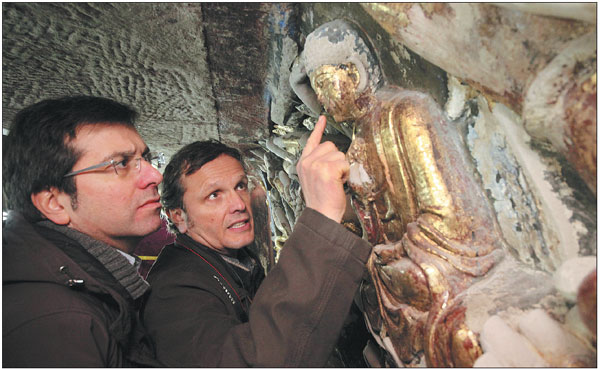 |
|
Italian experts help to restore statues of Bodhisattva of Mercy at a temple in Chongqing. [Photo by Luo Jiaguo/For China Daily] |
Italian academics share their knowledge to help preserve unearthed ancient relics.
Italy is a leader in the restoration and conservation of art and archaeology. Its experts are frequently called upon by countries around the world. This includes China, which is second only to the Mediterranean peninsula in terms of UNESCO World Heritage sites. Italy has 54 and China has 53.
Xinhua interviewed some of these experts to find out how exchanges between the two countries run.
Among them is Gilberto Corbellini, a professor who directs the Department of Human and Social Sciences and Cultural Heritage at the National Research Council - also known as the CNR - in Italy, an institution whose long-standing relationship with China dates back more than 20 years.
In 2014, the CNR entered into an accord with the Chinese Academy of Cultural Heritage. Both institutions select three-year projects they want to work on together, with each side putting in a share of the financing.
"Cultural heritage should be seen as the result of innumerable human choices, stratified over centuries and millennia," Corbellini wrote in a foreword to the 2018 book China and Italy: Routes of Culture, Valorization and Management. It was edited by CNR researchers Heleni Porfyriou and Bing Yu.
"This makes cultural heritage a vital part of a community, as the result of the sensitivity, thoughts, expectations, problems of men and women who, with their identities and personalities, have built the reality in which we live today," Corbellini wrote.
"I had the opportunity to meet and talk with the CACH director, and what emerged clearly is that there is a mutual interest, especially in the field of training," Corbellini told Xinhua. "On the one side, the possibility of transferring knowhow and technology to restorers and cultural heritage scholars in China. While at the same time, the opportunity to develop specific interventions together, in China, that are tailored to local cultural needs and expectations."
But what makes Italy a leader in this sector and why do Chinese archaeologists and scholars seek out its experts?
According to Porfyriou, it is because Italy has an extraordinary tradition in terms of a theoretical approach.